Google Chromebooks: what you need to know
The lowdown on the new Chrome OS netbooks from Google
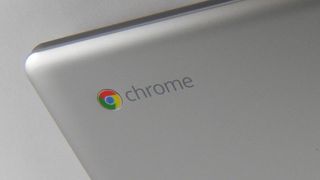
The long-awaited Chrome OS is finally making its debut in stores over the coming days - Google Chromebooks are already available for preorder and the first Samsung Chromebooks are due to ship on 1 July.
So is it the operating system reinvented, or just a nifty way to squeeze more speed out of laptops while making them simpler?
We've already taken a look at the first Google Chromebook in our Samsung Chromebook review.Here's what you need to know about Google's Chromebooks and the OS that they run.
Google Chromebooks are available
The Samsung Chromebook 5 series has a UK release date of 1 July, but you can preorder it already - it's priced at £399 for the 3G version and £349 for the Wi-Fi only flavour. An Acer Chromebook has been announced by Google, but has not yet been announced for the UK by Acer.
Chrome OS is just a browser
The first and most notable thing about the Chromebook is that – rather unsurprisingly – it runs Chrome OS, an operating system made by Google that is completely based around its Chrome browser. There's no desktop as such, just a browser window.
Get daily insight, inspiration and deals in your inbox
Get the hottest deals available in your inbox plus news, reviews, opinion, analysis and more from the TechRadar team.
Chrome OS is designed to be a cloud OS – meaning that it functions as a device to access the internet and use software and tools that exist on server farms rather than on your actual device.
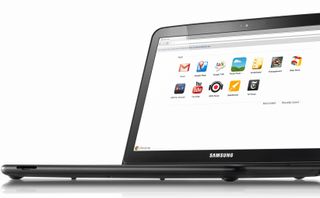
SAMSUNG CHROMEBOOK: Samsung has announced a Chromebook, available to preorder now
Chrome OS is web-only
There's no underlying operating system to Chrome: unlike, say, Apple's iOS you don't have a choice between native applications and web applications. Every Chrome application is a web application; think browser-based apps rather than desktop ones.
As a result, apps in the Chrome Web Store will run "all [desktop] browsers that support this technology."
Don't worry, though, some apps will work offline - something of a plus for those of us who travel to places where there's no decent coverage. However, as yet, there have been precious little app launches from Google.
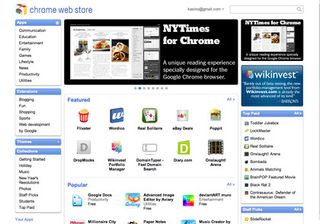
FAMILIAR: The Chrome Web Store reminds us of something. Your sarcasm detector should be beeping
Chrome OS is device independent
Chrome is all about getting you onto the web as fast as possible, and the experience is designed to be identical no matter what device you pick up. You just log in using your Google account and all your bookmarks, apps and even passwords are there providing you've enabled sync in Chrome.
Chrome OS is secure
All of your data is encrypted by default and there's a guest mode so other people can use your computer without accessing any of your stuff. Chrome OS also has a feature called Verified Boot, where the operating system is checked for integrity at boot and if anything's changed, you can roll back to a Last Known Good Configuration. Google says it's the most secure desktop operating system ever shipped.
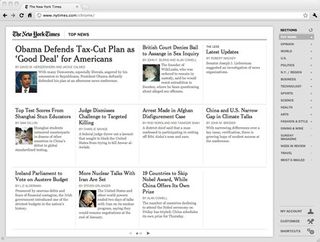
QUICK START: Big-name apps such as the New York Times are available, look good and work well
Chrome OS is fast to boot
You can go from switched-off machine to ready in less than ten seconds with a Chromebook. That's partly because of the solid state storage, which is much faster than traditional hard disks, and partly because Chrome has been optimised for speedy booting. You can resume much quicker:
"When waking from sleep mode, it's ready to go within one second," adds Samsung. "This means that wherever you are and whatever you're doing, your computer won't slow you down."
Chromebook storage
The Samsung Chromebook has just 16GB of storage – with most of your data meant to be left in the cloud. That 16GB drive is an SSD – solid state drive – which benefits from much faster read/write times.
However, this is also feasibly one of the problems with the Chrome OS principle – in that the moment you're offline, your laptop has limited access to your data unless you're using an app that works offline - see the information on connectivity below.
Plus – as the Sony PSN debacle has shown – no network is infallible, and people still have trust issues with keeping all of their work and personal information online rather than locally.
Chromebooks have long battery life
Samsung says: "The Series 5 [Chromebook] has a battery life of up to 8.5 hours, including five hours of video play, for all day use without the need to recharge." Expect even longer battery lives from other Google netbooks in future.
Chromebook connectivity
Connectivity comes in two flavours: Integrated world-mode 3G and dual-band 802.11n wireless. Google says eight-plus hours of everyday use should be realistic, and Chrome notebooks should hang around for eight days in standby mode.
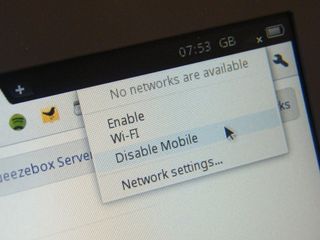
CONNECT: You can get a Chromebook with just Wi-Fi or 3G and Wi-Fi for £50 more (in the case of the Sansung)
The portotype Chromebook had no Caps Lock
The prototype Chromebook had no Caps Lock. There CR-48 prototype we previously looked at had no caps lock - "it'll improve the quality of comments all over the web," Google jokes - and there are no function keys. In fact, while the caps lock has been replaced by a search button, you can change it to a caps lock in the system settings.
The first Chromebooks are Intel, but they could be ARM-based in future
The first Chromebooks from Samsung and Acer run Intel Atom processors. Intel's Atom N570 1.66Ghz Dual Core processor is under the hood of the Samsung Chromebook. This processor brings HyperThreading and, as an Atom chip, is designed to use as little power as possible – with a TDP of 8.5 Watts. However, Chrome OS can run on so-called 'ARM books' - expect ARM Chrome OS devices to be on sale later in the year
Chrome OS updates
Being a cloud computer brings several benefits – one of which is that software will always be updated automatically. You won't need to download updates for the apps that you use – they will simply be updated when you access them.
In theory this means that you should have a more secure computer – because the anti-virus process goes on in the cloud and you have no or little data stored locally.
Here's the original Chrome OS promo.
-----------------------------------------------------------------------------------------------------
Dan (Twitter, Google+) is TechRadar's Former Deputy Editor and is now in charge at our sister site T3.com. Covering all things computing, internet and mobile he's a seasoned regular at major tech shows such as CES, IFA and Mobile World Congress. Dan has also been a tech expert for many outlets including BBC Radio 4, 5Live and the World Service, The Sun and ITV News.
Most Popular


